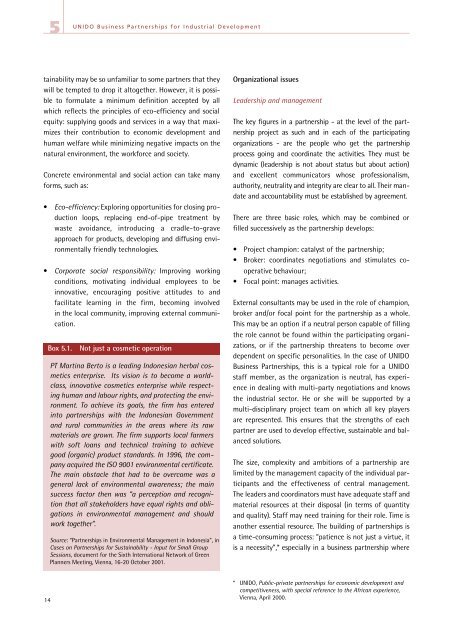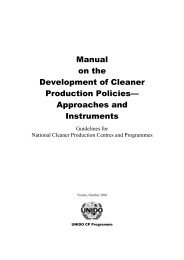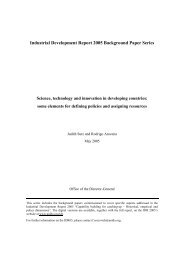Partnership Guide - Unido
Partnership Guide - Unido
Partnership Guide - Unido
Create successful ePaper yourself
Turn your PDF publications into a flip-book with our unique Google optimized e-Paper software.
14<br />
5<br />
UNIDO Business <strong>Partnership</strong>s for Industrial Development<br />
tainability may be so unfamiliar to some partners that they<br />
will be tempted to drop it altogether. However, it is possible<br />
to formulate a minimum definition accepted by all<br />
which reflects the principles of eco-efficiency and social<br />
equity: supplying goods and services in a way that maximizes<br />
their contribution to economic development and<br />
human welfare while minimizing negative impacts on the<br />
natural environment, the workforce and society.<br />
Concrete environmental and social action can take many<br />
forms, such as:<br />
• Eco-efficiency: Exploring opportunities for closing production<br />
loops, replacing end-of-pipe treatment by<br />
waste avoidance, introducing a cradle-to-grave<br />
approach for products, developing and diffusing environmentally<br />
friendly technologies.<br />
• Corporate social responsibility: Improving working<br />
conditions, motivating individual employees to be<br />
innovative, encouraging positive attitudes to and<br />
facilitate learning in the firm, becoming involved<br />
in the local community, improving external communication.<br />
Box 5.1. Not just a cosmetic operation<br />
PT Martina Berto is a leading Indonesian herbal cosmetics<br />
enterprise. Its vision is to become a worldclass,<br />
innovative cosmetics enterprise while respecting<br />
human and labour rights, and protecting the environment.<br />
To achieve its goals, the firm has entered<br />
into partnerships with the Indonesian Government<br />
and rural communities in the areas where its raw<br />
materials are grown. The firm supports local farmers<br />
with soft loans and technical training to achieve<br />
good (organic) product standards. In 1996, the company<br />
acquired the ISO 9001 environmental certificate.<br />
The main obstacle that had to be overcome was a<br />
general lack of environmental awareness; the main<br />
success factor then was “a perception and recognition<br />
that all stakeholders have equal rights and obligations<br />
in environmental management and should<br />
work together”.<br />
Source: “<strong>Partnership</strong>s in Environmental Management in Indonesia”, in<br />
Cases on <strong>Partnership</strong>s for Sustainability - Input for Small Group<br />
Sessions, document for the Sixth International Network of Green<br />
Planners Meeting, Vienna, 16-20 October 2001.<br />
Organizational issues<br />
Leadership and management<br />
The key figures in a partnership - at the level of the partnership<br />
project as such and in each of the participating<br />
organizations - are the people who get the partnership<br />
process going and coordinate the activities. They must be<br />
dynamic (leadership is not about status but about action)<br />
and excellent communicators whose professionalism,<br />
authority, neutrality and integrity are clear to all. Their mandate<br />
and accountability must be established by agreement.<br />
There are three basic roles, which may be combined or<br />
filled successively as the partnership develops:<br />
• Project champion: catalyst of the partnership;<br />
• Broker: coordinates negotiations and stimulates cooperative<br />
behaviour;<br />
• Focal point: manages activities.<br />
External consultants may be used in the role of champion,<br />
broker and/or focal point for the partnership as a whole.<br />
This may be an option if a neutral person capable of filling<br />
the role cannot be found within the participating organizations,<br />
or if the partnership threatens to become over<br />
dependent on specific personalities. In the case of UNIDO<br />
Business <strong>Partnership</strong>s, this is a typical role for a UNIDO<br />
staff member, as the organization is neutral, has experience<br />
in dealing with multi-party negotiations and knows<br />
the industrial sector. He or she will be supported by a<br />
multi-disciplinary project team on which all key players<br />
are represented. This ensures that the strengths of each<br />
partner are used to develop effective, sustainable and balanced<br />
solutions.<br />
The size, complexity and ambitions of a partnership are<br />
limited by the management capacity of the individual participants<br />
and the effectiveness of central management.<br />
The leaders and coordinators must have adequate staff and<br />
material resources at their disposal (in terms of quantity<br />
and quality). Staff may need training for their role. Time is<br />
another essential resource. The building of partnerships is<br />
a time-consuming process: “patience is not just a virtue, it<br />
is a necessity”,* especially in a business partnership where<br />
* UNIDO, Public-private partnerships for economic development and<br />
competitiveness, with special reference to the African experience,<br />
Vienna, April 2000.

















